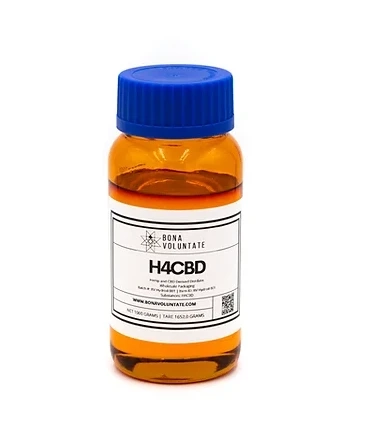By adding four hydrogen atoms to the CBD molecule, a synthetic cannabinoid called hexahydrocannabidiol (H4-CBD) is produced. Synthesis of H4CBD follows a path analogous to that of margarine produced from vegetable oil.
To what end does H4CBD serve?
Although H4CBD's precise qualities are still a mystery, what little we do know suggests that it has a much higher affinity for your brain's CB1 neuroreceptors than regular CBD. Given that CBD often lacks affinity for CB1 receptors, it is difficult to interpret these results. Users of H4CBD, however, frequently report an experience similar to that of CBD, albeit with significantly more psychoactivity.
It begs the question: Is H4CBD the same as CBD?
No. There are a lot of similarities between H4-CBD and regular CBD, but they are not the same molecule. First of all, CBD and H4CBD are essentially distinct from one another, from their chemical structure all the way down to the means by which they are obtained, resulting in wholly different perceived effects.
CBD vs. H4CBD
How do CBD and H4CBD Distillate stack up against one another? Examine the seven groups of cannabinoids below to see how they compare and contrast.
Source
Hemp is the source of both CBD and H4CBD. In contrast to CBD, which is a straight hemp byproduct, H4CBD must go through a series of transformations, including hydrogenation, before it reaches its ultimate state.
This means that H4-CBD, while not quite as synthetic as margarine, is still technically a synthetic cannabinoid. Although CBD synthesis is theoretically possible, there is no practical reason to do so given the hemp plant's naturally high CBD content.
Structure
H4CBD Distillate is a structurally modified version of CBD that looks and acts differently. As a result of adding four hydrogen atoms to the molecule's "head," its original characteristics have been altered.
Effects
Based on the findings of a single study conducted in 2006, it has been hypothesized that H4-CBD may be as much as 100 times more powerful than CBD. Hydrogenated versions of CBD, the study found, displayed an unexpectedly strong affinity for CB1 neuroreceptors in the brain.
Although not quite as strong as what has been reported with THC, the affinity was nevertheless noticeable. This view was also shared by a review of the literature published in 2017, although since then, no additional study has been done on the bioactive characteristics of H4CBD.
H4-CBD users have reported feeling effects similar to those of a CBD: THC ratio of 2:1. There is still a predominance of the typical, non-intoxicating effects of CBD, but there is also a tiny sense of intoxication that may help mitigate any unpleasantness or make the benefits of CBD more agreeable.
Potency
On the whole, it's probably safe to state that H4CBD has about three times the potency of CBD. Many people believe that H4CBD is 100 times as effective as regular CBD, although this is only true for the CB1 receptors, where CBD's effect was already extremely little, to begin with.
In mathematics, a small number multiplied by a hundred remains a small number. Although preliminary research suggests that H4-CBD may be more active at your CB1 receptors, it remains premature to declare that H4CBD Distillate is "100 times more effective" than CBD in every possible scenario.
Legality
Cannabinoids, both synthetic and natural, have their legal statuses hotly contested right now. Although the 2018 Farm Bill classifies all cannabinoids apart from delta-9 tetrahydrocannabinol as industrial hemp, the Food and Drug Administration (FDA) has yet to issue meaningful regulations to oversee the burgeoning online cannabinoid business. Keep coming back to this page for further updates.
Availability
The availability of CBD currently exceeds that of THC. Yet, the increasing demand for H4-CBD will undoubtedly result in the introduction of new and different products. Online retailers are stocking up on high-quality H4CBD Distillate, isolates, and completed goods, signaling the beginnings of a new hemp renaissance.
While looking for H4CBD, how can you know which supplier is the best?
As H4CBD is a relatively new cannabinoid, it's important to get it from a reputable company that has been in business for some time. The best H4CBD maker will have been around for some time and come highly recommended.
Their facilities will be licensed and up to code, and you'll have the option of buying either pre-made or tailor-made goods from them. If you've chosen the top H4-CBD provider, they'll have a dedicated customer service rep who will help you every step of the way and follow up to make sure you're happy with your purchase.
Are the benefits of H4CBD greater than those of CBD?
H4CBD Distillate has been studied by scientists ever since the 1940s, but it has only recently come to public attention.
In tandem with CBD's meteoric growth in popularity, interest in potential improvements has grown in related products. Is H4CBD really an underdog that has a shot at becoming the industry standard? Considering how popular and widespread CBD is, this seems highly improbable. But, if it turns out that H4CBD is more effective than regular CBD in some areas, it will undoubtedly create a market needing to be met.
Think of the combined advantages of H4CBD and CBD instead of seeing them as adversaries. CBD may be the milder, all-natural choice, whereas H4CBD would be the slightly modified, stronger option. CBD and H4CBD will both be crucial components of the developing modern cannabis pharmacopeia.
0


